
Mini Mathur
For Mini Mathur, Mind the Malhotras was like catching up with an old friend.
Her co-star in the Amazon Prime Video India show, Cyrus Sahukar, was her contemporary on MTV India in the TV channel’s teething days.
“I’m very critical of everything I watch, including my husband’s films and my own work. I’m aware that my show has its limitations, but it works despite them because of the familiarity we have with each other. The magic really happens because Cryus and I know each other inside out,” says Mini, in an exclusive interview.
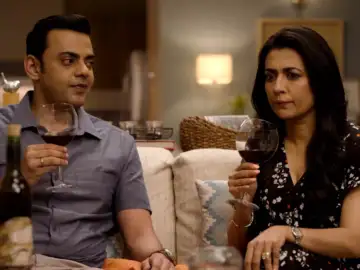 Cyrus Sahukar and Mini Mathur in Mind the Malhotras
Cyrus Sahukar and Mini Mathur in Mind the Malhotras
Mind the Malhotras, in its best parts, does really feel like an extended sketch from the MTV days. There’s Mini, Cyrus, and that impeccable comic timing. And as Mini insists, the timing isn’t in the written word as much as it’s in the actors jamming with each other to the hilt. Sameer Kochhar, who joins them in Season 2, is also part of the club. “Sameer is Cyrus’ closest friend. It’s the first time we’ve worked with him, but it really felt like one of those dinners where we’re just having fun.”
Like Mini and Cyrus, Sameer was also a television presenter in the early 2000s. The two were, in fact, the first VJs (video jockeys) of India. Mini looks back at the late 1990s and early 2000s, that coincided with the birth of MTV in India, as the time when TV was cool. “I don’t know if we were really that cool. But we were the audience’s only choice. At that time, if you wanted to watch television beyond Doordarshan and the saas bahu soaps, MTV was the only choice. That’s why we were embraced by the audience, even though all we were doing was being ourselves.”
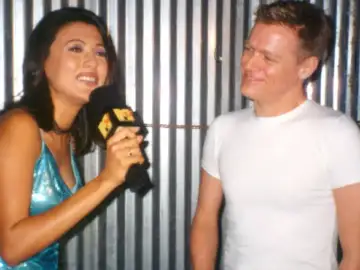 Mini Mathur interviewing Bryan Adams on MTV India
Mini Mathur interviewing Bryan Adams on MTV India
Mini feels her batch of VJs also started out at a time when young India was struggling to figure out their voice. Sandwiched between liberalisation and the new millennium, the youth then really needed the handholding to be able to warm up to the changing times. “Cryus, Asif (Seth) and I were the only VJs who could speak Hindi. Others like Sophie (Choudry), Laila (Rouass), Cyrus (Broacha) and Malaika (Arora) were still a bit anglicised. We could really go out on the streets and talk to people.”
That ability to reach out to a larger audience seduced Mini, who later decided to jump on the GEC (General Entertainment Channels) bandwagon as the host of Sony’s singing reality show Indian Idol. “After our batch, I felt something shifted in the very DNA of VJs. They were all trying to be style icons. Maybe they were trying to match the template of what a VJ should be but the fact is that we were just trying to be ourselves. We didn’t have any standards to set. Also, at that time, television opened up. There were reality shows, game shows, travel shows, food shows. VJing wasn’t the only ‘cool’ thing to do,” says Mini.
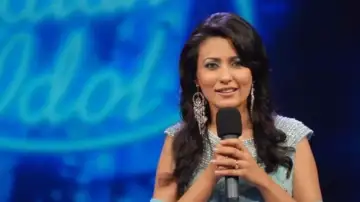 Mini Mathur on Indian Idol
Mini Mathur on Indian Idol
But now, the VJ figure is borderline extinct. Years after Channel V shut down and MTV gravitated more towards reality shows like Roadies and Splitsvilla, the VJ is now lost in the crowd of social media influencers. “Anybody can claim to be a VJ now. If I want to be a world-class gemologist, all I need to do is change my Instagram bio. You don’t need credentials anymore. That’s my problem. Sorry if I sound like a cynical auntyji (laughs), but you can decide to be or claim to be an influencer overnight without having the medals and the badges.”
Mini adds that the delusion stems from not only the pace of validation, but also the easy access to a medium. But therein lie the perils of social media as well. “TikTok has shown us you could be an influencer one day, and if it gets banned like it did in India, no one would know your face outside of that world. Unless you’ve worked on ground and built a credibility over the years. What if the government decides to ban Instagram tomorrow? People will only remember the faces and voices who’ve proven themselves beyond social media.”
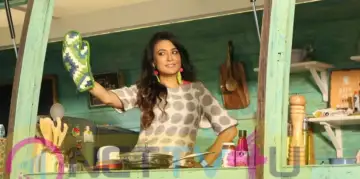 Mini Mathur on her food show The Mini Truck
Mini Mathur on her food show The Mini Truck
But she also blames the consumers of social media content, who may not value the gifts of liberalisation as deeply as the youth did back in the MTV days. “There was a lot of hope and josh in the youth. It was great to relate to a cult that your entire generation subscribed to. But where are the thrills now? There’s cancel culture, so much negativity because of social media. There are no new highs, but deeper lows every day.”
It helps then that in the early 2000s, Mini chose to go the GEC way. But even there, she feels an ecosystem of presenters and hosts is missing. Like every new MTV VJ now is an offshoot of Roadies and Splitsvilla, every host or presenter on mainstream television is a film star who’s in it only for the money. “In the West, a presenter is an actual profession, and not something they do on the side. Even till 65, they get their own talk shows. But that’s not the case in India. We’ve not had an Oprah (Winfrey) or a Late Night Show. That’s because in India, the producers think they need the mainstream treatment like dhol or a star-host to help the TRPs. But those stars are not really skilled presenters, except for Amitabh Bachchan, who revels in his job as a host on Kaun Banega Crorepati. He’s the best.”
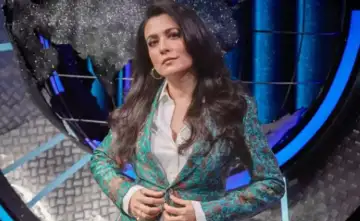 She also didn’t limit herself as a presenter of only youth-centric or singing reality shows. She ventured into a wide range of areas as a host, from food (The Mini Truck), wildlife (Iss Jungle Se Mujhe Bachao), sports (Sports Ka Superstar), education (Discovery School Super League) to politics (Dilli Dil Se). And she feels a presenter’s primary responsibility, like an actor, is to be malleable as per the format and nature of the show.
She also didn’t limit herself as a presenter of only youth-centric or singing reality shows. She ventured into a wide range of areas as a host, from food (The Mini Truck), wildlife (Iss Jungle Se Mujhe Bachao), sports (Sports Ka Superstar), education (Discovery School Super League) to politics (Dilli Dil Se). And she feels a presenter’s primary responsibility, like an actor, is to be malleable as per the format and nature of the show.
“If I’m a presenter, if you give me a potha of legal accounting, I’ll be able to present it. Similarly, if you give me cartoon to narrate, I should be able to do that. Those are my skills. I should feel seasoned enough to do that,” says Mini, who feels she hasn’t enjoyed that range as an actor.
“The saas bahu sagas were at the peak when I was doing television. Acting was anyway not my first love so I didn’t want to endorse or represent those shows. It’s only now, thanks to streaming, that I’ve found the role I’d been waiting for in Shefali.”Shefali in Mind the Malhotras is a new chapter in Mini’s life. But as someone who’s broken the fourth wall all her life, does her interaction with the camera change when she switches gears from presenter to actor? “For me, even as a presenter, I didn’t really notice the camera. I used to just interact with it like I interact with another person. I never talked at it. It was never inanimate for me. So for me, the transition hasn’t been tough. Except that now, as an actor, you’ve to keep more of a track on your trajectory of movement, light, where you’re looking. You’ve to be more conscious of where you are vis a vis the camera, as opposed to a host, where I’ve to run around and the camera will have to follow me because I was the action. I didn’t have to hit any marks.”
Where acting differs from presenting is in fact the pitch. “As a host, you’re the energy of the show. You’re the glue that holds it together. In the initial days of my career, I remember being very high-pitched because I’d never learnt any voice modulation. Because I’d done MBA and marketing, instead of theatre or any kind of television training. But as I experimented, I realised I don’t always need a throw in my voice for every show. It’s different for when you have a mic, and when you’re in the room hosting a beauty or travel show. So it was easy to mould my pitch as per my acting role as well.”
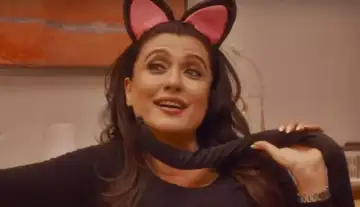 Mini Mathur on Mind the Malhotras
Mini Mathur on Mind the Malhotras
The new innings of her career comes with a similar challenge – of not getting boxed into one kind of a role. “I’m fascinated by the world that actors like Seema Pahwa comes from. When I watched Ram Prasad Ki Tehrvi (2020), I could see myself in that world. But people don’t imagine me in those roles. Now, I’m ready to challenge myself as an actor. But they should also see me in those roles for me to be able to do more.”
She feels breaking out of this vicious cycle is possible only when someone trusts her with that one breakthrough role. “I keep telling casting directors that I’m keen. But they keep offering me more of the same. I can’t go chasing directors because they’re all around me. I’m married to one, others keep visiting. It’s only when they see me in their world can I get a chance to show my range. And if that doesn’t happen, then I’ll have to create that space myself. That’s what everyone in the West does. Wohi karna padega,” Mini says, laughing.
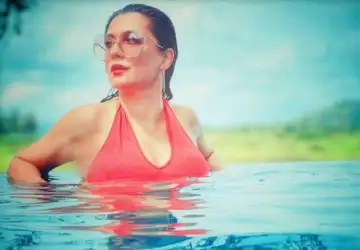 There’s an interesting parallel between, strangely, her and Ayushmann Khurrana, who started out as MTV VJs, then moved to hosting GEC music reality shows, and are now actors. But Mini is clear she doesn’t want to be a star. “I feel like I’ve missed that one decade when I could’ve worked towards being one had I wanted to be. But I was busy getting an education, and I feel that’s served me well. Besides, I don’t miss the adulation that comes with being a star. My husband is a director so all the attention is there, I don’t want more of it.”
There’s an interesting parallel between, strangely, her and Ayushmann Khurrana, who started out as MTV VJs, then moved to hosting GEC music reality shows, and are now actors. But Mini is clear she doesn’t want to be a star. “I feel like I’ve missed that one decade when I could’ve worked towards being one had I wanted to be. But I was busy getting an education, and I feel that’s served me well. Besides, I don’t miss the adulation that comes with being a star. My husband is a director so all the attention is there, I don’t want more of it.”
Speaking of her husband, that’s a parallel journey she relates more to. Both of them started in the non-fiction realm; Kabir was a documentary filmmaker before he turned mainstream. But both continue to represent forms of entertainment that despite being fiction, are extremely political. “Kabir has always maintained that politics isn’t only electoral. But how a person sees any aspect of their life. Your ideology defines the politics of the room or a situation. I’m against extremism of any kind, left or right. I just want there to be room for dialogue.”
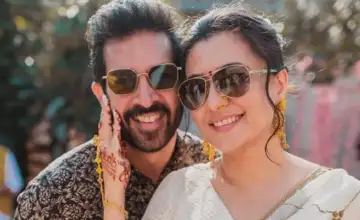 Kabir Khan and Mini Mathur
Kabir Khan and Mini Mathur
Initially extremely vocal on Twitter, Mini has only distanced herself from the platform since that’s not her politics of engagement. “I think there are no real people on Twitter. There are only bots and motivated shit. I was one of the first to get vocal on Twitter but I don’t open it for weeks now.”
Mini has now found a new outlet in acting, and her breakthrough role of Shefali is a great release. She once described Shefali as herself “on steroids”. “When you manage to blend yourself into your character, push the boundaries and say something you wouldn’t in real life, it’s a joy. I attribute more things to the character than what’s written,” she says.
It’s heartening to watch Mini Mathur live vicariously through Shef. It’s also a much-needed reminder to those who grew up along the MTV days. A reminder that they’re still the spunky, liberated ‘Youngistaan,’ who just have to find newer ways to say their truth




 Driving Naari Programme launched in Chandigarh
Driving Naari Programme launched in Chandigarh






























